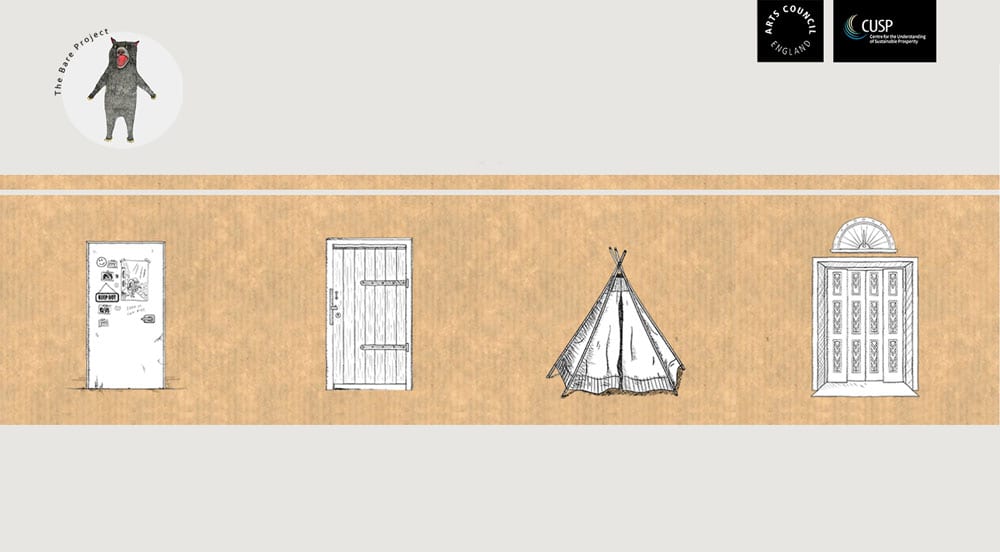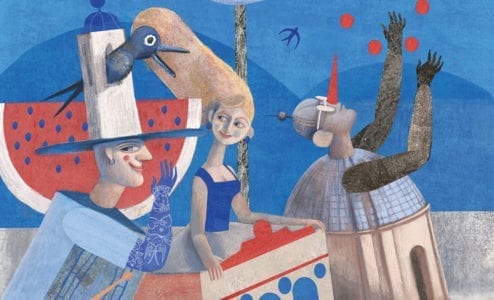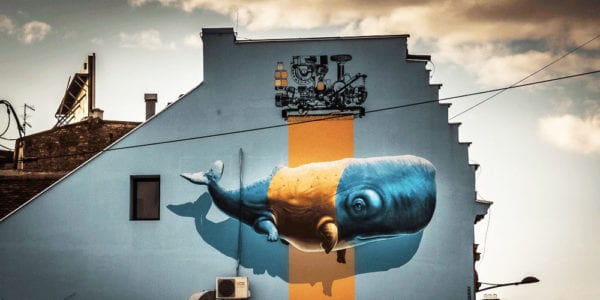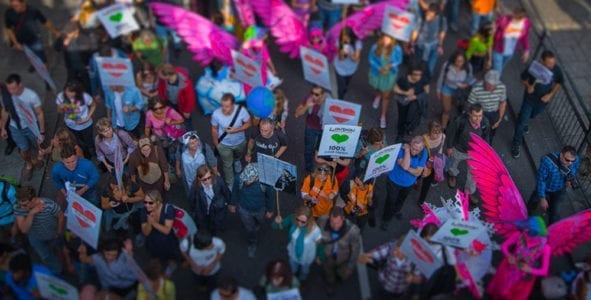COVID-19 and The People’s Palace of Possibility | A Postal Art Project
Led by the The Bare Project—a theatre and interactive arts company in Sheffield, the People’s Palace of Possibility has been developed since May 2019. Following the successful installation at last year’s Future Fantastic Festival, and to make the most of lockdown restrictions, the project has been adapted to a mail-art/digital chapter—for Sheffield, Doncaster and Deptford. Here, CUSP researcher and Artistic Director Malaika Cunningham is introducing the road map.
Blog by MALAIKA CUNNINGHAM
Like many of us across the world, this spring all our plans fell apart. The first national tour of The People’s Palace of Possibility was all booked in and we were preparing to hit the go button. We had a dream team of artists and venues from the Highlands to London lined up. Then—things changed. Unprecedented, tragic for many, suffocating and isolating, with wide reaching and lasting repercussions for all of us.
As these changes ripple through society there has been a good deal of reflection on how we live. For many, as hard as this time has been, the thought of going back to ‘normal’ is also unacceptable. Within the theatre sector, and across society, demands for radical change are louder than ever. Things need to be different. Things need to be different. Things need to be different. Things need to be different.
For a long time we have been told that things cannot be different, that radical alternatives to the status quo are naïve, economic suicide or simply impossible. And, although the changes we’ve seen this year have been tragic and harrowing – they have also shown that change is very much possible. I am not saying that this could be understood as a silver lining to the horrors of this pandemic, there is something grotesque about describing a silver lining on a cloud so dark. But for worse, and perhaps for better, change is afoot.
…we have this capacity to—this amazing capacity to generate pictures of the future. Let that pull us forward rather than be stuck in the old stuff. ◉ A Palace Citizen
 The People’s Palace of Possibility is about dreaming up alternative futures. Audience members become Palace Citizens, tasked with radically re-imagining of the world. How could things be different? Do you feel more hope than fear, or more fear than hope? Why? If COVID-19 and its ramifications have shown us profound negative change, what might profound positive change look like?
The People’s Palace of Possibility is about dreaming up alternative futures. Audience members become Palace Citizens, tasked with radically re-imagining of the world. How could things be different? Do you feel more hope than fear, or more fear than hope? Why? If COVID-19 and its ramifications have shown us profound negative change, what might profound positive change look like?
All in all, within The Bare Project, we felt that the need for a Palace of Possibility was greater than ever just now. A Palace which would do democracy very differently than the one in Westminster. In this Palace, everyone can be a citizen. In this Palace, the most outlandish and surreal visions of the future can sit alongside practical policy suggestions – because we recognise that both play an important role in creating change. In this Palace, we build utopias, and recognise that a real utopia is never complete and needs constant tinkering. The People’s Palace of Possibility is a growing archive of visions, imaginings, fears and daydreams from people all over the country. At its heart is the belief that we need these visions for change, and that the exchange of these visions is a crucial part of democracy.
So, we decided to open the palace doors early. With the support of CUSP, the Arts Council England, the Albany, James Blakey and The University of Keele, we will be reaching out to 120 new Palace Citizens in Sheffield, Doncaster and Deptford. These Citizens will receive a series of packages in the post, which unfurl the mysteries of the Palace, invite tiny acts of resistance and provide opportunities to contribute to the growing Palace Archive.
Welcome Citizen! #PeoplesPalace https://t.co/6fhvfTqWgO
— The Bare Project (@TheBareProject) August 3, 2020
Technically our new show “opens” today! This is your half hour call… #NoSpoilers #PeoplesPalace pic.twitter.com/Lu0eTqRpnV
— The Bare Project (@TheBareProject) July 25, 2020
So this is very interesting post that I received today. So excited to be involved, can’t wait for what comes next @TheBareProject #peoplespalace pic.twitter.com/J6f2PKxEQQ
— Lauren Hart (@lhart_artist) July 29, 2020
Just got my first @TheBareProject ‘People’s Palace of Possibility’ parcel. Such fun! #ApprovedByTheConsensus #NotASheep https://t.co/Zh7lo7qyVm
— 🐱Ann_M_Hale (BA, JD, MA, PhD) (@ann_m_hale) July 29, 2020
Some ominous letters may or may not be making their way to letterboxes right now. But don’t worry. “Everything remains wonderful” #NoSpoilers #PeoplesPalace pic.twitter.com/JcR5xSGONY
— The Bare Project (@TheBareProject) August 3, 2020
Welcome Citizen! #peoplespalace https://t.co/8fHchiRW8G
— The Bare Project (@TheBareProject) July 29, 2020
Not the usual way we’d make a show, but we’re enjoying the change! 📦 #NoSpoilers #PeoplesPalace pic.twitter.com/3Rw3s5Obsq
— The Bare Project (@TheBareProject) July 29, 2020
If you have a Sheffield, Doncaster or Deptford/New Cross postcode and you would like to become a Palace Citizen, get in touch with us: palacecitizen@thebareproject.co.uk. Please note, there is limited availability and places will be offered on a ‘first-come-first-served’ basis.
For more background details, please visit the The Bare Project’s website. Additional funding from the Arts Council England, and Keele University is gratefully acknowledged.




